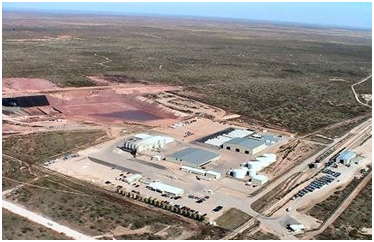Radioactive Waste 51 - Waste Control Specialists in Andrews County Texas 1
Harold Simmons, who died in December of 2013, was a Texas billionaire who established a site for disposing of radioactive waste in West Texas. Simmons made his money in garbage collection, drug stores, metals and chemicals. He has been called the "King of Superfund Sites."
Simmons bought a hazardous waste disposal company called Waste Control Specialists (WCS) and started working on the nuclear dump in Andrews County. Texas has very lax controls on environment pollution with people from polluting companies sitting on regulatory boards. After six years of lobbying, Simmons convinced the Texas legislature to pass a law authorizing private companies like his WCS to be granted licenses to store radioactive waste.
WCS immediately started the process of obtaining two licenses that would allow it to store a total of sixty million cubic feet of low-level radioactive waste from Federal and state sources. The acceptable types of waste come from places like nuclear reactor operations, nuclear laboratories, and hospitals. One benefit of staying with the low-level wastes is that it is not necessary to go through the time consuming and expensive process of getting Federal approval for storage of high-level nuclear waste such as spent fuel rods from nuclear reactors.
There was resistance from against issuing the licenses by environmentalists and some state authorities. State engineers and geologists raised the concern that radioactive materials could leach out of the dump site into the ground water. In a memo from 2007, four staffers from the Texas Commission on Environmental Quality (TCEQ) stated that because the site was close to the water table in that part of Texas, it "makes groundwater intrusion into the disposal units highly likely." Three staffers at the TCEQ resigned rather than sign off on the license request from WCS. One said "I started getting the idea that these people are going to license this thing no matter what. I felt that in clear conscience I couldn't grant a license with what was being proposed." The director of the TCEQ quit in 2008 and became a highly paid lobbyist for WCS. The licenses were granted to WCS in the fall of 2008. Critics said that it was a blatant example of the revolving door between the public and the private sectors and of regulatory capture of an agency by the industry they are suppose to regulate.
Once Simmons had the licenses in hand, he began expanding the storage site. His plan was to move beyond local storage to take waste from all over the United States. There is a growing and lucrative market for nuclear waste storage that he was buying into. Simmons wanted his site to be the biggest in the U.S. Thirty six states do not have permanent disposal sites for their low-level radioactive waste. WCS had signed a contract with Vermont to store their waste. Simmons wanted to expand the contract to take waste from other states. An obscure agency in the Texas government called the Low-Level Radioactive Waste Disposal Compact Commission had the authority to expand the WCS contract. It had seven members, six of whom were appointed by Governor Rick Perry who received a large campaign donation from Simmons. There was widespread opposition to the contract expansion but the Commission approved it and WCS is able to take radioactive waste from other states.
WCS will reap the profits from the nuclear waste disposal but if radioactive materials migrate from the site into the Texas ecosystem including the water table, the Texas taxpayers will have to bear the cost. The WCS case is an excellent illustration of how back room political dealing and campaign donations can trump science and the public interest.
Waste Control Specialists site in Andrews Country, Texas:
